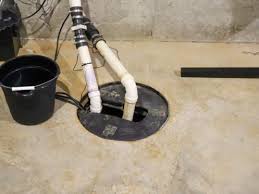Perhaps the most obvious reason a sump pump is needed is to prevent basement flooding. Heavy rains, melting snow, or rising groundwater can overwhelm even well-constructed homes. Without a system in place to divert water away, basements can fill quickly—destroying flooring, drywall, insulation, furniture, and personal belongings.
A sump pump can evacuate thousands of gallons of water per hour, acting quickly to stop flooding before it starts.
- Protects Your Home’s Foundation
Water around your foundation can be dangerous—even if it never enters the basement. Persistent moisture can erode the concrete foundation, cause cracks, and compromise the structural integrity of your home. Over time, this may lead to settling, shifting, or even foundation failure.
A sump pump helps by reducing hydrostatic pressure, which occurs when groundwater builds up around your home’s foundation. By redirecting water away from the base of your home, a sump pump minimizes this pressure and reduces the likelihood of costly foundation repairs.
- Prevents Mold, Mildew, and Musty Odors
Even small amounts of moisture can lead to big problems over time. A damp basement is the perfect breeding ground for mold and mildew, which can grow within 24–48 hours of water exposure. Mold doesn’t just damage your home—it can affect your indoor air quality and cause respiratory issues for your family.
A working sump pump keeps the area dry, reducing humidity and helping to maintain a cleaner, healthier living space.
- Protects Against Sewer Backups
Some homes are equipped with sump pumps that are connected to both stormwater and sewage systems. During periods of extreme weather, overwhelmed sewer lines can back up into your home through the drains.
A sump pump with a check valve can prevent this type of backup by ensuring that water flows out of your home—not in.
- Essential in High Water Table Areas
If your home is built in an area with a high water table, groundwater can collect around your foundation year-round, not just during storms. Without a sump pump, this constant moisture can leak into the basement and cause chronic dampness or flooding.
Homeowners in low-lying or flood-prone areas especially benefit from the protection a sump pump provides, giving them peace of mind during wet seasons.
- Prepares Your Home for Resale
A home equipped with a functioning sump pump is more attractive to buyers. It demonstrates that you’ve taken proactive steps to protect the property and avoid future issues. A dry basement also increases usable living space, which is a big selling point.
In fact, in many areas, having a sump pump installed is a requirement for obtaining homeowner’s insurance or meeting building codes.
- Works With Other Drainage Systems
If your home has a French drain, weeping tile system, or basement waterproofing, a sump pump is often the final piece of the puzzle. These systems direct water to a collection point, but it’s the sump pump that actually removes the water from your home.
Without the pump, your basement could still flood even with top-tier drainage solutions in place.
What Happens Without a Sump Pump?
Many homeowners don’t realize they need a sump pump—until it’s too late. Here’s what can happen if your home lacks one:
- Flooded basement during storms or snowmelt
- Ruined appliances (e.g., furnace, washer/dryer, water heater)
- Warped flooring and damaged drywall
- Electrical hazards from water contact with wiring
- Foundation cracks or wall bowing
- Expensive restoration costs and higher insurance premiums
- Loss of valuable personal belongings
The cost of basement flooding can be immense, often totaling thousands—or even tens of thousands—of dollars in damage and remediation. In comparison, a sump pump system typically costs $800–$2,000 installed and lasts 7–10 years with proper maintenance.
Do All Homes Need a Sump Pump?
Not every home requires a sump pump, but certain factors make them more likely to be necessary:
- Your home has a basement or crawlspace
- You live in an area with heavy rainfall or snowfall
- Your property has a history of flooding
- Your home is on flat or low-lying land
- Your basement feels damp or smells musty
- You’ve seen water pooling near the foundation
Even if your home hasn’t flooded before, changes in weather patterns or nearby development can impact your drainage. A sump pump is a smart investment for prevention, not just response.
Conclusion
A sump pump is not just a convenience—it’s a critical component of your home’s defense against water damage. It helps keep your basement dry, protects your foundation, prevents mold and mildew, and preserves your property’s structural integrity and value.
For homeowners in flood-prone or high-moisture areas, a sump pump provides priceless peace of mind. Combined with a battery backup system, it ensures your home remains protected even during power outages and severe storms.
If you’re unsure whether your home needs a sump pump in Fishers, consult a licensed plumber or waterproofing specialist. A simple evaluation today could save you from a devastating flood tomorrow.



